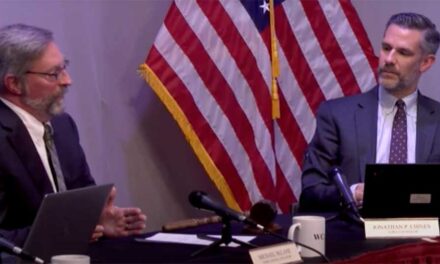Published in the July 23, 2018 edition
WAKEFIELD – Wakefield Police Chief Rick Smith and Health Director Ruth Clay are working with the local legislative contingent to seek passage of a bill that will close the “bodyworks loophole” and combat human trafficking.
“We need a team effort to stop human trafficking and ensure the lives and welfare of the victims are protected,” Chief Smith said. “This is a quality of life issue for our community and we take these issues seriously recognizing the impact on the victims, our community and our local businesses. The current loophole has been exploited in the past and we need to close it.”
Attorney General Maura Healey applauded the Massachusetts Senate’s passage of Senator Mark Montigny’s legislation that will close the current “bodyworks loophole” in Massachusetts and help combat human trafficking across the state. AG Healey, Senator Montigny, and the Baker-Polito Administration’s Division of Professional Licensure (DPL) worked together on the legislation that the Senate unanimously passed last week.
S. 2599, An Act to regulate bodywork therapy, filed by Sen. Montigny in conjunction with AG Healey and the DPL, will close a loophole that has exempted businesses that act as fronts for human trafficking from state oversight by adding bodyworkers, bodywork therapy and bodywork facilities and schools to the current state licensing structure overseen by the DPL.
“In case after case that we prosecute, human traffickers exploit the bodyworks loophole to oppress victims, escape oversight, and avoid law enforcement,” said AG Healey. “This legislation will allow the state to shut down fronts and illicit actors, while helping to legitimize law-abiding healing practitioners. We thank Senator Montigny and the DPL for their efforts to ensure that we have all the tools at our disposal to hold human traffickers accountable.”
“Human trafficking is an atrocious crime that inflicts an incomprehensible level of brutality and suffering upon victims. For too long traffickers have seized upon this loophole to perpetuate such heinous activity,” said Senator Montigny. “The Senate has again sent a clear message that we will do all that is necessary to further prevent, prosecute, and protect against human trafficking. I want to thank Attorney General Healey and DPL for joining this effort, which has resulted in strong measures to crack down on trafficking.”
“The Baker-Polito Administration has for years prioritized efforts and fought to close the bodyworks loophole and protect against human trafficking,” said Commissioner Chuck Borstel of the Division of Professional Licensure. “We appreciate the Attorney General and Senator Montigny for working together with us as partners to make Massachusetts a safer state for all residents.”
“This legislation will allow law enforcement to better hold accountable those who make a profit off the sexual exploitation of others,” said Chief Brian Kyes, President of the Massachusetts Major City Chiefs Association. “The Massachusetts Major City Chiefs are happy to partner with these stakeholders on this important bill.”
The AG’s Office has investigated many establishments that purported to offer “bodyworks” or “bodywork therapy” but were in fact fronts for human trafficking operations. The individuals running these facilities characterized and advertised these businesses as providing “bodyworks” services to evade state licensing requirements that currently apply to massage therapy but are explicitly exempted for “bodyworks” under the current law. Through these sham businesses, defendants offered commercial sexual activity.
Under the current law, and unlike massage therapy, the practice of bodyworks therapy is not licensed by the DPL. “Bodyworks” is defined in the bill as the practice of a person who uses touch, words or directed movement to deepen awareness of patterns of movement in the body.
This legislation restructures the Board of Registration of Massage Therapy to include two bodyworks practitioners and a law enforcement representative specialized in human trafficking. The bill requires the Board to adopt regulations for the safe practice of bodyworks and allows practitioners and the public to participate in public hearings to assist the Board in setting training and certification requirements for each modality.
An Act to regulate bodywork therapy also authorizes the DPL to exempt certain modalities if the practice is otherwise licensed or accredited. Modeled after the current licensing structure for massage therapy, the bill sets out a license and application process, sets standards for advertising, provides a mechanism for reciprocity for out of state licenses, and authorizes the DPL to inspect and investigate complaints. Local police departments will also have the authority to inspect bodywork facilities. Under the legislation, current, legal bodyworks therapists are given time to comply with the new law. The bill now goes to the House for consideration.
Since January 2017, the AG’s Office has pursued indictments in connection with five separate criminal enterprises involving 10 individuals who set up illicit massage or bodyworks establishments as fronts for human trafficking. For example, in April, the Office charged<https://www.mass.gov/news/two-indicted-for-trafficking-women-for-sex-at-springfield-massage-parlors> Stephen C. Forsley and Liu Yang with human trafficking and money laundering for trafficking women for sex at the Day Spa and the Health and Relaxation Spa in Springfield, both of which were set up as fronts for illicit activity.
AG Healey has made combating human trafficking a priority of her office. The AG’s dedicated Human Trafficking Division focuses on policy, prevention and prosecution and includes a team of specialized prosecutors, victim advocates and Massachusetts State Police troopers who handle high impact, multi-jurisdictional human trafficking investigations and prosecutions across the state. The Division also works closely with other state, federal and local agencies and NGOs in the development of policy initiatives and training programs. Through the Human Trafficking Division, the AG’s Office has charged more than 40 individuals in connection with human trafficking since the law went into effect in 2012.
Senator Montigny has long prioritized combating human trafficking in the Massachusetts State Senate, filing one of the first bills in the country which ultimately became law in 2011. That legislation, which included a similar partnership with the Attorney General’s Office, criminalized human trafficking for commercial and sexual exploitation of people, including severe punishments ranging from five years to life imprisonment. It also provided survivors with affirmative protections and access to the Victims of Human Trafficking Trust Fund.
The Division of Professional Licensure works closely with state, local and federal government to combat human trafficking. The Division’s Office of Investigations participated in several joint inspections throughout the Commonwealth of Massage Establishments to ensure facilities were properly licensed and were not exploiting the existing loophole to engage in illicit and illegal activities.




